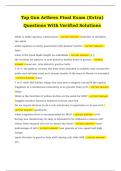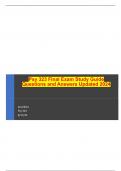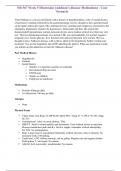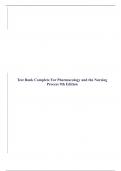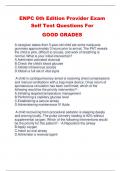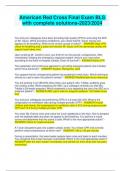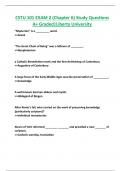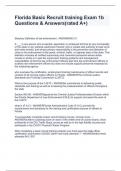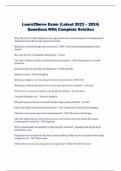Reflection With Correct Answers
A good financial planning report must include an analysis of all the following except:
A. where you are now
B. where you want to be
C. Why you failed previously
D. How to reach your goals CORRECT ANSWERS C. Why you failed previously
Usual financial planning goals include the following except:
A. retirement funding
B. Current lifestyle
C. Career planning
D. Estate planning CORRECT ANSWERS C. Career Planning
A client's formal Financial planning report that summarizes all of the following except:
A. strategy - how the client gets where he or she wants
B. Turnover - when and how the client will sell certain investments
C. Analysis - where the client is now
D. Objectives - where the client wants to be CORRECT ANSWERS B. Turnover - when
and how the client will sell certain investments
All of the following is true regarding the types of financial problems clients will face in
their lives?
A. taxes add to the cost of an investments and slow progress toward the client's goals
B. The inability to quickly turn invested capital into spendable cash is related to inflation
C. Clients should not be concerned about leaving to assets to children or young adults
D. Psychological comfort has no place in the financial planning process CORRECT
ANSWERS A. taxes add to the cost of an investment and slow progress toward the
client's goals
Which of the following is true regarding the contends of the financial plan?
A. The length of the presentation of the plan should always be the same, regardless of
the contents of the plan
B. once the plan is in place it should not be changed
C. Checklists are usually a bad idea in the plan
D. The plan should have a discussion of how to achieve goals CORRECT ANSWERS
D. The plan should have a discussion of how to achieve goals
The six steps in the financial management process outlined by the authors include the
following except:
A. establish goals
B. collect data
C. measure performance
,D. establish living wills CORRECT ANSWERS D. Establish living wills
Which of the following is true regarding risk?
A. attitudes towards risk are easy to measure
B. Defining the nature of risk is objective for each person
C. Attitudes about risk are likely to change over a person's lifetime
D. Risk attitudes are due to factors that are relatively easy to deal with CORRECT
ANSWERS C. Attitudes about risk are likely to change over a person's lifetime
Which of the following statements is true regarding financial objectives?
A. Good financial objectives are stated in aspirational terms
B. All financial objectives have short time horizon
C. After they have been identified, they should be prioritized
D. Once identified, they do not need to be revisted CORRECT ANSWERS C. After they
have been identified, they should be prioritized
Which of the following is true regarding developing a financial plan?
A. this involves budgeting income and expenses
B. if a client needs an emergency fund, no recommendations are needed
C. Estimating returns should not be needed
D. the planner should guard against projections of the client's expected financial
position CORRECT ANSWERS A. this involves budgeting income and expenses
Which of the following is true regarding a person's standard of living?
A. maintaining a person's lifestyle should generally take a minority of a person's
resources
B. income not allocated to maintain a person's standard of living should be allocated to
other financial objectives
C. It should be easy to accomplish financial objectives even if almost all a person's
income is used to maintain lifestyle
D. Every person should spend the same amount of income to maintain lifestyle
CORRECT ANSWERS B. income not allocated to maintain a person's standard of living
should be allocated to other financial objectives
Which of the following is true regarding financial security?
A. financial security is based on absolute wealth or income
B. taxes are not a consideration when determining financial security
C. a pension plan left by a decedent to a grandchild may retain less than a quarter of its
value
D. Wealth and income are diverted because of inflation and slippage CORRECT
ANSWERS C. a pension plan left by a decedent to a grandchild may retain less than a
quarter of its value
Which of the following is true regarding taxes?
A. high tax brackets indicate planning opportunities
B. it is not possible to shift income through gifting
,C. It is not really possible to save on taxes by deferring income
D. It is not possible to transfer wealth through generations' tax free CORRECT
ANSWERS A. high tax brackets indicate planning opportunities
Which of the following is NOT part of the definition of an Investment Advisor as defined
by the Investment Advisers Act of 1940 (the Act)?
A. provides advice regarding securities
B. is in the business of providing advice
C. holds a CFP or series 7 license
D. receives compensation for advice CORRECT ANSWERS C. holds a CFP or series 7
license
The Act defines compensation as
A. commission only
B. fees only
C. receipt of any economic benefit
D. 12 (b) 1 fees only CORRECT ANSWERS C. receipt of any economic benefit
Which of the following is NOT exempt from the definition of an investment advisor?
A. publisher of the local newspaper, the Daily Beagle
B. insurance agent who advises clients about no load mutual funds
C. Those who advise clients solely about U.S. treasury obligations
D. local attorney who occasionally advises clients about setting up investment accounts
for their jury awards CORRECT ANSWERS B. insurance agent who advises clients
about no load mutual funds
The "brochure rule" requires that the investment adviser do which of the following?
A. provide the client with an audited financial statement of the adviser's net worth
B. Deliver a written disclosure document (such as part II of form ADV) to each client
C. Provide a part I of form ADV to each client
D. provide clients with copies of the adviser's marketing brochure CORRECT
ANSWERS B. Deliver a written disclosure document (such as part II of form ADV) to
each client
The anti-fraud provisions of the Act applies to:
A. all investments advisors, even those who are exempt rom registration
B. only those who must register with the SEC or the states
C. only situations where security transactions take place
D. only advisors of pension plans CORRECT ANSWERS A. all investments advisors,
even those who are exempt rom registration
which of the following statements about the definition of "security" under the investment
advisory act is correct?
A. the act defines the term "security" in the broadest possible fashion
B. the act defines the term narrowly, to include only stocks, bonds and certificates of
deposit
, C. The SEC periodically holds hearings to define the term
D. the definition is left to the NASD CORRECT ANSWERS A. the act defines the term
"security" in the broadest possible fashion
Financial Advisor John Smith manages investment accounts for clients for mostly in his
home state of Ohio. He should register with the Ohio division of securities if:
A. he has any clients outside of Ohio
B. The assets under his management exceed 30 million
C. Assets under his management are less than 25 million
D. He is not a CFP certificant CORRECT ANSWERS C. Assets under his management
are less than 25 million
All of the following are the disciplinary actions that the CFP Board may take against a
financial advisor who is in violation of the Code of Ethics except:
A. Private Censure
B. Lawsuit against the advisor in Federal Court
C. Public letter of admonition
D. Suspension CORRECT ANSWERS B. Lawsuit against the advisor in Federal Court
Which of the following are PROHIBITED uses of the CFP marks?
A. www. CFPadvisors.com
B. CFP Advisors, INC.
C. All Star CFPs, Inc.
D. All of the Above CORRECT ANSWERS D. All of the above
Under the CFP Board's Code of Ethics and Professional Responsibility, a financial
planner who has reason to suspect illegal conduct in his or her organization must:
A. disclose the information to his or her supervisor
B. alert regulatory authorities if the organization does not take suitable to remedy the
situation
C. not use the process to harass another planner
D. all of the above CORRECT ANSWERS D. all of the above
An important requirement that is common to the SEC rules for investment advisors and
the CFP Board's Code of Ethics is:
A. Full disclosure of all material information to clients
B. a ban on accepting commissions
C. a ban on "soft dollar"
D. rules for custody of assets under managment CORRECT ANSWERS A. Full
disclosure of all material information to clients
The principle of objectivity in the Code of Ethics and Professional Responsibility of the
CFP Board of Standards requires that a CFP practitioner
A. must disclose in writing any conflicts of interest that might compromise the adviser's
objectivity or independence prior to establishing a relationship with the client

